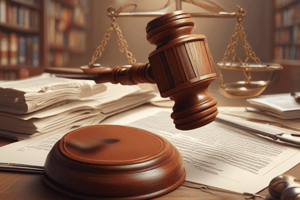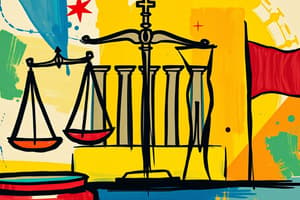Podcast
Questions and Answers
Due process means that agents of the criminal justice system must conduct criminal proceedings in a fundamentally ______ way.
Due process means that agents of the criminal justice system must conduct criminal proceedings in a fundamentally ______ way.
fair
The due process clause specifies that 'no person can be deprived of life, liberty, or property without due process of ______.'
The due process clause specifies that 'no person can be deprived of life, liberty, or property without due process of ______.'
law
The Fifth Amendment is constructed as a very long ______ that covers many different topics.
The Fifth Amendment is constructed as a very long ______ that covers many different topics.
sentence
The criminal justice system must adhere to legal requirements, including police, courts, and ______.
The criminal justice system must adhere to legal requirements, including police, courts, and ______.
The right to ______ is not explicitly mentioned in the Constitution, but the Supreme Court has ruled that it exists.
The right to ______ is not explicitly mentioned in the Constitution, but the Supreme Court has ruled that it exists.
The Supreme Court and other appellate courts are responsible for interpreting laws and deciding what rights people have in the United States if a law violates any of these ______.
The Supreme Court and other appellate courts are responsible for interpreting laws and deciding what rights people have in the United States if a law violates any of these ______.
Citizens can sue a government employee under a law called Section ______, which is part of the United States Code.
Citizens can sue a government employee under a law called Section ______, which is part of the United States Code.
The exclusionary rule was created by the Supreme Court to stop police from doing things that violate someone’s ______.
The exclusionary rule was created by the Supreme Court to stop police from doing things that violate someone’s ______.
Retributive justice means that the punishment should fit the ______.
Retributive justice means that the punishment should fit the ______.
Procedural justice holds that an act is just if it was done using a ______ process.
Procedural justice holds that an act is just if it was done using a ______ process.
Study Notes
Civil Liberties and Their Protection
- State or federal laws violating individual freedoms are considered invalid.
- The Supreme Court and appellate courts interpret laws regarding individual rights in the United States.
- Citizens can seek legal recourse if a government official violates their rights through Section 1983 of the U.S. Code.
Exclusionary Rule
- Created by the Supreme Court to prevent the use of illegally obtained evidence in court.
- Ensures a fair justice system that respects constitutional rights.
Concepts of Justice
- Justice can be interpreted as equality (equal treatment) or equity (treatment based on individual circumstances).
- Retributive justice focuses on punishment proportionate to the crime committed, rooted in the law of retribution (lex talionis).
- Length of prison sentences often correlates to the severity of the crime.
Procedural Justice and Due Process
- Procedural justice emphasizes fairness in the decision-making process; debates exist about what fair process entails.
- Due process requires agents of the criminal justice system to conduct proceedings fairly, respecting the rights of the accused.
- The principle of due process is embodied in the Fifth Amendment for the federal government and the Fourteenth Amendment for state governments.
Constitutional Clauses and Rights
- The due process clause ensures that no person is deprived of life, liberty, or property without due legal process.
- Fundamental civil liberties may be implicit; the right to privacy is not explicitly mentioned in the Constitution but recognized by the Supreme Court as essential for fairness.
Components of the Criminal Justice System
- The U.S. criminal justice system consists of police, courts, and corrections, all linked by adherence to the rule of law.
- The Constitution serves as the ultimate legal authority, safeguarding individual freedoms from government infringement.
Trial by Jury
- Disputes in factual cases are resolved through jury trials, which play a crucial role in ensuring justice.
Understanding Justice
- Concepts of justice are multi-dimensional, encompassing equality, equity, and procedural fairness.
- Both procedural justice and due process are critical to maintaining integrity in the criminal justice system.
Studying That Suits You
Use AI to generate personalized quizzes and flashcards to suit your learning preferences.
Description
This quiz explores the fundamental freedoms guaranteed by law and how violations can be contested in the United States. It delves into the role of the Supreme Court and the legal recourse available to citizens through Section 1983 when their rights are infringed by government officials.




